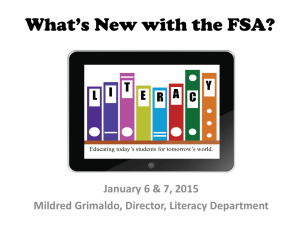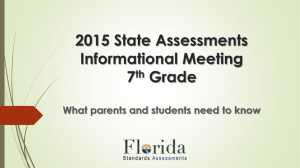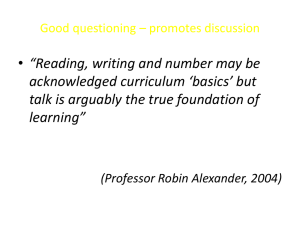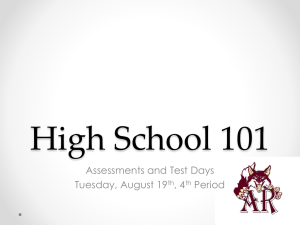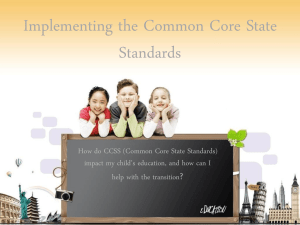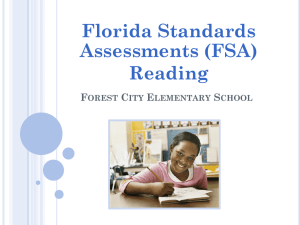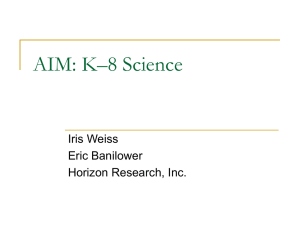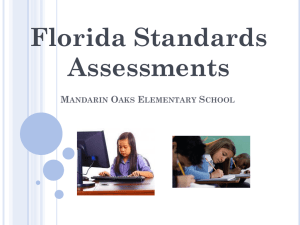Math Night FSA PowerPoint
advertisement
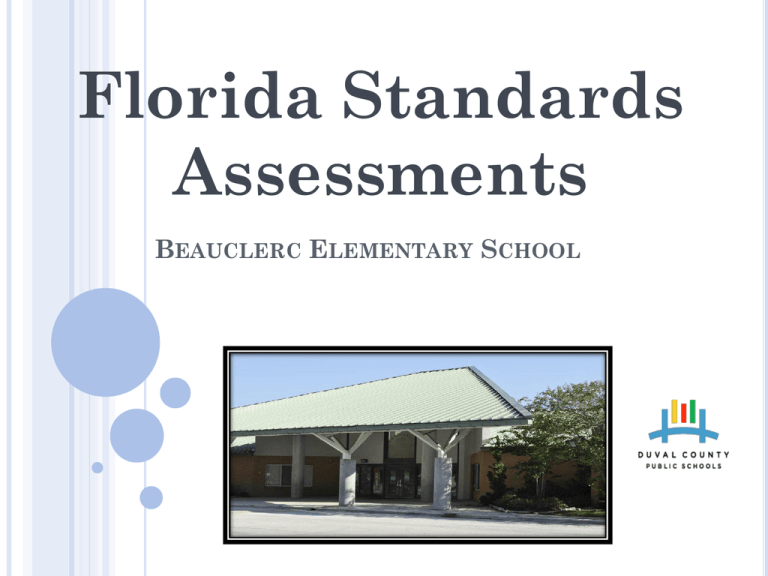
Florida Standards Assessments BEAUCLERC ELEMENTARY SCHOOL Transition from FCAT to FSA Assessments Assessments in 2012-13, and 2013-14 Assessments in 2014-15 FCAT 2.0 Reading Grades 3 to 10 FSA English Language Arts Grades 3 to 11 FCAT 2.0 Writing Grades 4, 8, 10 FSA English Language Arts Writing Component Grades 4 to 11 FCAT 2.0 Mathematics Grades 3 to 8 FSA Mathematics Grades 3 to 8 2 ASSESSMENT CALENDAR CHANGES IN STUDENT EXPECTATIONS The Florida Standards Assessment (FSA) developed by the American Institutes for Research (AIR) demand students… maintain an increased sense of accountability toward their own learning develop a concept beyond an opinion and move to “support and evidence” think in a more conceptual, analytical and global manner utilize higher-order, critical thinking skills shift from mere memorization of terms to a deep understanding of meaning transfer skills to new experiences operate in a more student-centered environment with built in peer collaboration 4 WEBB’S DEPTH OF KNOWLEDGE MATHEMATICS TESTING RESPONSE TYPES 1. Editing Task Choice – The student clicks a highlighted word or phrase, which reveals a drop-down menu containing options for correcting an error as well as the highlighted word or phrase as it is shown in the sentence to indicate that no correction is needed. The student then selects the correct word or phrase from the drop-down menu. For paper-based assessments, the item is modified so that it can be scanned and scored electronically. The student fills in a circle to indicate the correct word or phrase. 2. Editing Task – The student clicks on a highlighted word or phrase that may be incorrect, which reveals a text box. The directions in the text box direct the student to replace the highlighted word or phrase with the correct word or phrase. For paper-based assessments, this item type may be replaced with another item type that assesses the same standard and can be scanned and scored electronically. RESPONSE TYPES 3. Hot Text – a. Selectable Hot Text – Excerpted sentences from the text are presented in this item type. When the student hovers over certain words, phrases, or sentences, the options highlight. This indicates that the text is selectable (“hot”). The student can then click on an option to select it. For paperbased assessments, a “selectable” hot text item is modified so that it can be scanned and scored electronically. In this version, the student fills in a circle to indicate a selection. b. Drag-and-Drop Hot Text – Certain numbers, words, phrases, or sentences may be designated “draggable” in this item type. When the student hovers over these areas, the text highlights. The student can then click on the option, hold down the mouse button, and drag it to a graphic or other format. For paper-based assessments, drag-and-drop hot text items will be replaced with another item type that assesses the same standard and can be scanned and scored electronically. RESPONSE TYPES 4. Open Response – The student uses the keyboard to enter a response into a text field. These items can usually be answered in a sentence or two. For paper-based assessments, this item type may be replaced with another item type that assesses the same standard and can be scanned and scored electronically. 5. Multiselect – The student is directed to select all of the correct answers from among a number of options. These items are different from multiple-choice items, which allow the student to select only one correct answer. These items appear in the online and paper-based assessments. RESPONSE TYPES 6. Graphic Response Item Display (GRID) – The student selects numbers, words, phrases, or images and uses the drag-and-drop feature to place them into a graphic. This item type may also require the student to use the point, line, or arrow tools to create a response on a graph. For paper-based assessments, this item type may be replaced with another item type that assesses the same standard and can be scanned and scored electronically. 7. Equation Editor – The student is presented with a toolbar that includes a variety of mathematical symbols that can be used to create a response. Responses may be in the form of a number, variable, expression, or equation, as appropriate to the test item. For paper-based assessments, this item type may be replaced with a modified version of the item that can be scanned and scored electronically or replaced with another item type that assesses the same standard and can be scanned and scored electronically. RESPONSE TYPES 8. Matching Item – The student checks a box to indicate if information from a column header matches information from a row. For paper-based assessments, this item type may be replaced with another item type that assesses the same standard and can be scanned and scored electronically. 9. Table Item – The student types numeric values into a given table. The student may complete the entire table or portions of the table depending on what is being asked. For paper-based assessments, this item type may be replaced with another item type that assesses the same standard and can be scanned and scored electronically. EXAMPLE QUESTION MATH FSA EXAMPLE QUESTION MATH FSA EXAMPLE QUESTION MATH FSA EXAMPLE QUESTION MATH FSA ENGLISH LANGUAGE ARTS FSA EXAMPLE FOR ELA FSA FLORIDA STANDARDS INFORMATION SITE http://fsassessments.org/ PRACTICE TESTS http://www.fsassessments.org/wpcontent/uploads/2014/06/FL_PT_QuickGuide_10-8142.pdf http://fsassessments.org/training-tests The purpose of these training tests is to become familiar with the system, functionality, and item types; the tests are not intended to guide classroom instruction. Descriptions and response instructions for each item type are included in the Training Test User Guide that may be accessed in the “Resources” pages of this portal. Users should refer to the tutorials or the guide to familiarize themselves with the different features and response instructions for each item type. STRATEGIES TO PREPARE FOR NEW STANDARDS AND ASSESSMENTS • Selected new curriculum materials and revised curriculum guides and assessments in alignment of new standards and assessments • District sponsored Summer Teacher Academy • Revised district assessments to mirror expectations of new state assessment (multiple correct answers, short responses, drag and drop) • Infused blending learning throughout the curriculum to expose students to computer based expectation of new assessment • Upgraded instructional and content support to schools through reorganized district curriculum and instruction team STRATEGIES TO PREPARE FOR NEW STANDARDS AND ASSESSMENTS • Calibration of Math Lessons • I-Ready Math • After School Tutoring • District Coach • Departmentalization • Math Nights
